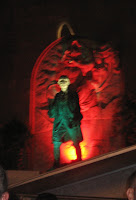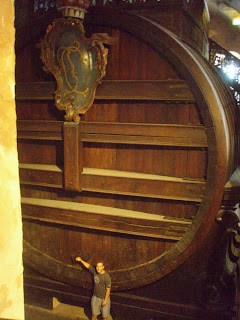These channels are about 24 um wide (2.4 x10^-5 m)
Creux du Van
Recently I traveled to Noiraigue with a
colleague of mine to hike in the Jura Mountains. The hike we chose was to the Creux du Van, which is a giant cliff face shaped by a glacier. The cirque cliff is nearly 1000 feet tall and is unlike anything I’ve ever seen. They look much taller when you are laying on a rock at the edge of the cliff, looking directly down. At the time of our hikewe didn’t know how tall the cliff was, so we at least determined that it takes a rock nearly nine seconds to fall to the ground. The view was absolutely amazing. To the east you can see the mountain range of the Alps stretching across the entire horizon, to the north there are three lakes, Northwest a grassy valley with stereotypical mountain-swiss houses, and of course, beauty in all directions. I highly recommend the hike, but I would go on a day of clear skies, otherwise much of the view will disappear.
Bellinzona
After our hike we took the train to Bellinzona, in the Italian part of Swi
tzerland. When we arrived we navigated our way
to the local youth hostel where we would stay. Immediately after we went into our room some of our hostel-mates returned and we met them.
After they left some random man walked into our room began looking around, just standing in the doorway. He could speak a little English and was asking us if the room was full, but he appeared to be either incredibly drunk or on some other kind of drugs... Since we just arrived we didn’t really know, but there were bags by the remaining three beds so we told him we thought it was full. He wanted to sleep in our room, so I asked if he had reservations, but he didn’t, saying that the reception closed too early (which was at 10:00). We told him that we’d ask the other roommates if there was a bed open, but without a reservation we couldn’t just let him stay in a bed. He insisted that we go down and find our roommates and he would just stay in the room and wait for us, by himself. He was either trying to steal from us, hoping we were naïve, or he was really just looking for a free room. In either case, he tried walking his way into our room as we were leaving so we ended up having to pull him out of the room. Later we saw him getting kicked out of the hostel by the owner.
We walked around that night to view the city, which was formed within the walls of three connecting castles. At night all three castles are illuminated and are simply unbelievable. The city is in a valley between two parallel mountain ranges, and the connecting castle walls were built to cross this valley eliminating any passage through it. On the train ride home a man who writes about “magic places” in Switzerland told me som
e history of Bellinzona, as well as many other places in Switzerland. The walls had been built by the Swiss when the Italians from Milan began expanding their territory. The swiss didn’t want them to pass through “their territory” so they completely sealed off the passage through this part of the alps and built guard towers (turrets) probably every 15-20 meters.
This town was my favorite of all the towns I have visited so far in Switzerland. The night life died early (1:00 a.m.) and there doesn’t appear to be that
much to actually do there (there probably is if you know people there though), but the design of the city, the buildings and castles, as well as the amazing landscape were incredible.
The next day Andhyk and I went to the top of the lower, largest looking castle and went to the top of the watch tower where we had a spectacular panoramic view of the entire area. We didn’t have time to visit all three castles because we were headed to Lugano for the day, so we quickly saw the things that were the most appealing to us boarded the train.
We arrived in Lugano and immediately headed to the lake, which is beautiful and has amazing scenery to enhance it. We were hungry by this time and Andhyk wanted to eat at Burger King, so I decided to eat American food for my first time since my arrival in Europe. I must say, for being 2-3 times the cost of burger king in the U.S., I expected at least the same quality, but my sandwich was absolutely terrible… the fries were good though haha. The moral of the story is, don’t eat American food in Europe when you can have authentic European food, although that should go without saying. We stopped by the information office (adjacent to Burger King) and found some parks and castles to go look at. We went to two parks, one of which had a great view of the lake, although on the way to the park we took a wrong set of stairs and were nearly attacked by a guard dog at the edge of private property. We went to view one of the local castles, although when we arrived it was more of an armored house with a tall tower. I don’t know the name of it, but it looked like an Asian structure, with the stereotypical pagoda style roof. It was very cool from the outside, but access was closed for the day so we were unable to go inside. We then we took a tram up to the top of Monte Brè, where we climbed to the top of a small chapel at the top of the mountain. From here we had a spectacular panoramic view of the entire region. We could see the entire lake, plus two smaller ones, and the mountains everywhere. From the top you can also see as far as Milan, Italy. It is worth going to see at least once!
Berlin, Germany
The following weekend I went to Berlin, Germany, which was also amazing. I took several guided tours, knowing that they would be a great source of historical information, and they were worth it (all but one of the tours was free.) I spent one day just looking at the major attractions like 
I also wanted to say that it was a pleasure meeting everyone in Bern.





























